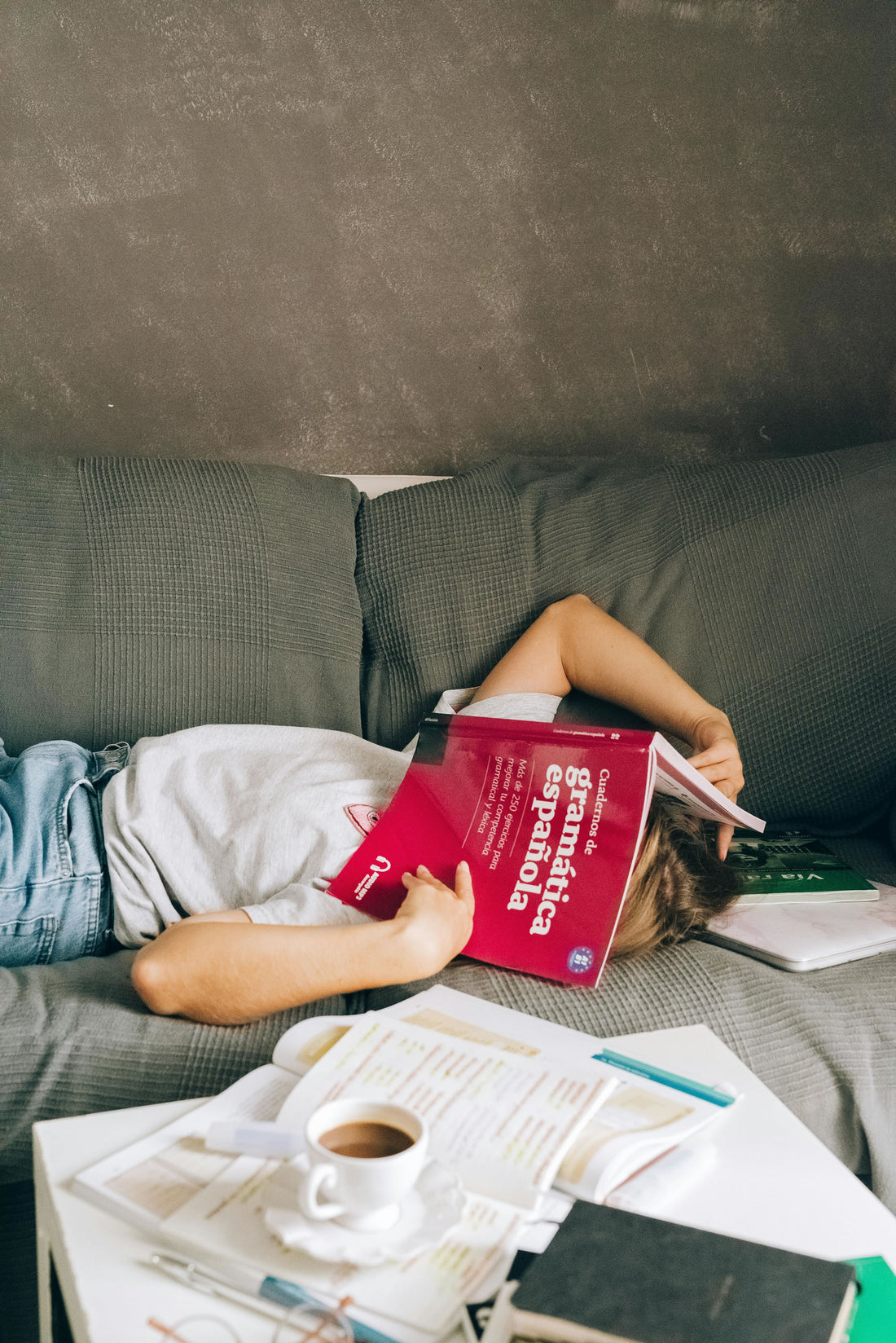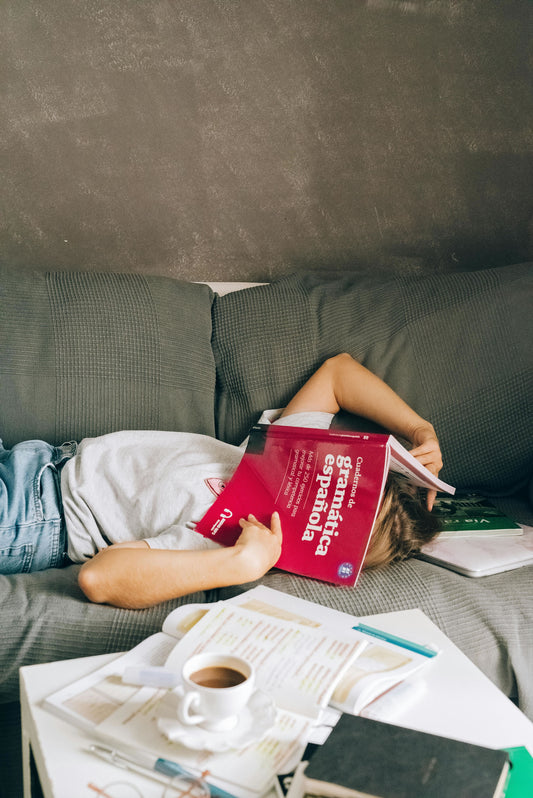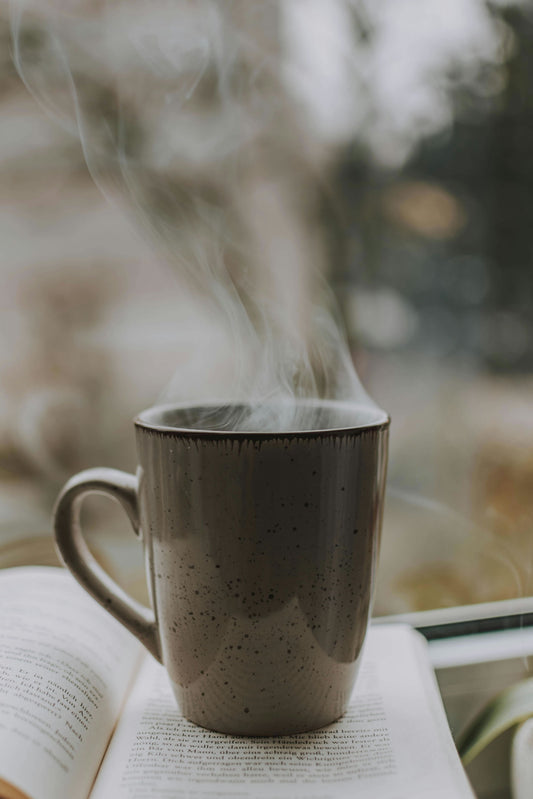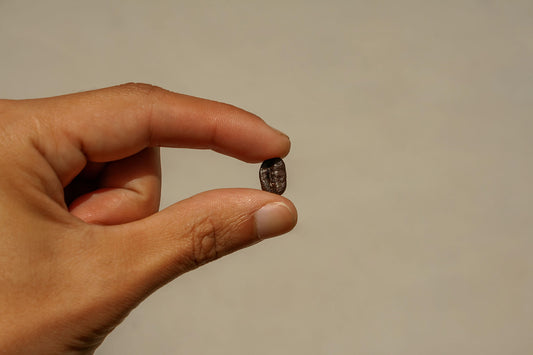Have you ever found yourself reaching for a cup of coffee or sipping on a fizzy soda, only to feel more sleepy than energised after the caffeine kicks in? It's a puzzling experience when the very thing that’s supposed to perk you up does the exact opposite.
Caffeine increases alertness by interfering with certain chemical processes in the brain that regulate the sleep-wake cycle. However, once the body completely metabolizes caffeine, it can make people feel tired.
/ IN THIS ARTICLE
01. Understanding Caffeine's Effects
02. Why Caffeine Can Make Some People Feel Tired?
03. How Caffeine Affects Sleep Quality?
04. Individual Differences in Caffeine Metabolism
05. Hydration and Caffeine Intake
06. Connection of Caffeine, Stress, and Adrenal Fatigue
07. Alternatives to Caffeine for Energy
08. The Importance of Moderation
09. Juju Blends’ Approach to Healthy Caffeine Consumption
14. Frequently Asked Questions
15. Conclusion
Understanding Caffeine's Effects
Caffeine is a naturally occurring stimulant found in the leaves, seeds, or fruits of more than 60 plant species worldwide. It’s most commonly associated with coffee beans, tea leaves, and cocoa beans, and is known for its reviving properties that can help banish drowsiness and restore alertness. But apart from these natural sources, caffeine is also a popular additive in energy drinks and certain sodas, making caffeine consumption a part of many people's daily routines.
The general effects of caffeine on the body and mind are varied and can be quite profound. Once ingested, caffeine in coffee, tea, or energy drinks is absorbed into the bloodstream, where it travels to the brain to exert a stimulating effect. This can lead to a temporary boost in energy levels and improved mental alertness—reasons why a cup of joe is a morning ritual for countless individuals. At the same time, consuming caffeine can increase heart rate and blood pressure, and may have diuretic properties, all of which contribute to the overall caffeine effects on the body.
Regular caffeine consumption, especially in the form of coffee consumption, has been associated with various health benefits, including a potential decrease in the risk of certain diseases like Parkinson's and Type 2 Diabetes. Yet, it's important to note that the effects of caffeine can vary from person to person, and the caffeine affect is not always entirely positive. For some, caffeine intake, especially in large amounts, can lead to feelings of anxiety, restlessness, and even tiredness—paradoxically contrary to the stimulant's intended effects.
Conversely, some people may experience the unwanted effects of coffee with even small amounts, making even one or two cups of coffee enough to trigger symptoms like jitteriness or an upset stomach. It's this complex interaction between the body’s response to caffeine and the amount ingested—coupled with individual sensitivity—that has prompted much discussion around the ideal levels of caffeine intake and how best to utilize the stimulant for its benefits, without falling prey to its less desirable effects. Whether you're sipping on a steaming cup for the morning ritual or reaching for an afternoon pick-me-up, understanding your body's response to consuming caffeine is key to maximizing the positive effects while minimizing any of the potentially negative ones.
Why Caffeine Can Make Some People Feel Tired?
Caffeine is widely regarded as an energy booster, but some people report feeling tired after consuming caffeine. This response can be baffling, particularly when you're banking on that cup of coffee to chase away the sleepiness.
One of the key effects of caffeine is its diuretic properties. Caffeine can cause your body to lose fluids at a quicker pace, leading to mild dehydration in some cases. Dehydration is commonly associated with feeling tired, as every cell in your body relies on water to function correctly; when you're dehydrated, your body cannot perform at its best, often leaving you feeling sluggish or lethargic.
For many, the cycle of sleep deprivation and a subsequent reliance on caffeine to get through the day is a familiar pattern. However, while caffeine can keep you awake for short periods, it can also lead to disrupted sleep cycles over time. Caffeine has a half-life of about 5 to 6 hours, meaning if you have a coffee drinking habit in the late afternoon or evening, it could still be affecting your system come bedtime. This could result in difficulty falling asleep, restless nights, and a decreased quality of sleep overall, leading to sleep debt which can accumulate day by day, causing you to feel more tired even after you've consumed caffeine.
Another factor is caffeine tolerance. Over time and with regular use, your body may build up a tolerance to the stimulating effects of caffeine. This means the more coffee you drink, the more coffee you may need to achieve the same wakefulness effect. Eventually, your morning caffeine make you tired because your body's baseline for alertness has shifted. This tolerance can inadvertently contribute to the feeling of fatigue, as you may find yourself feeling the effects less and more dependent on caffeine to just reach what feels like a "normal" level of energy.
While caffeine can give you a quick boost, it doesn't replace the deep, restorative sleep that your body fundamentally needs. Continued reliance on caffeine while incurring a sleep debt is a recipe for entering a chronic state of feeling tired. Each cup of coffee might offer a short-term remedy, but without addressing the sleep deprivation, a cycle of fatigue can perpetuate, leaving you feeling tired, regardless of the caffeine.
The reasons coffee can make some individuals feel tired are nuanced. They can stem from diuretic effects, contribute to sleep cycle disruption, or be a product of an increasing caffeine tolerance. To mitigate these effects, it's crucial to monitor your coffee drinking habits and be mindful of the timing of your caffeine intake, ensuring it doesn't interfere with your sleep patterns.
How Caffeine Affects Sleep Quality?
When it comes to maintaining your energy levels and overall health, nothing quite replaces the importance of good, quality sleep. However, caffeine consumption, particularly when it occurs in the late afternoon or evening, can significantly challenge your ability to secure a good night's sleep and consequently, leave you feeling sleep deprived the following day.
A study suggests that 400 mg of caffeine taken 0, 3, or even 6 hours prior to bedtime significantly disrupts sleep. Even at 6 hours, caffeine reduced sleep by more than 1 hour. This degree of sleep loss, if experienced over multiple nights, may have detrimental effects on daytime function.
Caffeine consumption can make you fall asleep later, sleep less hours overall, and make your sleep feel less satisfying . It can also reduce the amount of deep, slow-wave sleep you get, which is a critical stage of sleep for feeling refreshed the next day.
Caffeine affects the brain by blocking adenosine receptors. Adenosine is a sleep-promoting chemical that is produced in the brain during our waking hours. Normally, adenosine builds up in the brain the longer you are awake. The more it builds up, the sleepier you become. When caffeine blocks this process, you remain alert and vigilant. But this may also be why caffeine consumption can disrupt sleep.
Individual Differences in Caffeine Metabolism
Most people tend to regulate their caffeine consumption based on how it affects them, both objectively and subjectively, with the methyl-xanthine substance. Yet, the amount needed to achieve these desired outcomes can differ greatly from one individual to another.
For many years, it's been recognized that various factors, including age, gender and hormones, liver conditions, being overweight, smoking habits, and diet, influence how caffeine is metabolized, cleared from the body, and how it behaves pharmacokinetically. Moreover, caffeine has been found to interact with several medications.
In this blog we will explore and discuss these factors in detail, drawing on the latest research regarding genetic differences that impact caffeine levels and its effects, particularly focusing on how these genetic factors influence caffeine's pharmacokinetics and pharmacodynamics, ultimately affecting how much caffeine individuals consume.
Several specific genes are responsible for caffeine metabolism in the body, affecting the activity of enzymes that break down caffeine in the liver. The rate at which these enzymes work is influenced by an individual's genetic makeup. Those with a genetic profile that leads to faster enzyme activity will metabolize caffeine quickly. This typically translates to a shorter duration of caffeine's stimulating effects and potentially a reduced risk of discomfort or overstimulation after consuming caffeine.
Individuals with genetic variants associated with slower caffeine metabolism experience prolonged effects of the stimulant because caffeine remains active in their system for a more extended period. These people might find even small amounts of caffeine excessively stimulating or feel the effects of adenosine, the neurotransmitter responsible for promoting sleep, being blocked for too long, which can lead to an increase in adenosine levels once caffeine wears off, resulting in increased tiredness.
When people regularly consume caffeine, their body's response can also adjust over time, potentially influencing how quickly they metabolize caffeine. Regular consumers might find that the energizing effects of caffeine diminish as their body becomes accustomed to its presence, and they may need to consume more caffeine to achieve the same level of alertness. Over time, this adaptation can also influence sensitivity to caffeine and contribute to the overall variability in response.
The variations in how caffeine affects adenosine receptors, which are part of the nervous system, can also contribute to individual differences in response to caffeine. Some people might inherently have more or fewer receptors or receptors that bind caffeine differently, playing into how strongly caffeine can block the effects of adenosine and promote wakefulness or, conversely, cause an eventual crash in energy levels.
Hydration and Caffeine Intake
Diuretic Effects
Caffeine, present in caffeinated beverages, has diuretic effects, meaning it encourages the body to produce more urine. When you consume a caffeinated drink, the caffeine circulates in your bloodstream and ultimately reaches your kidneys, where it alters the normal kidney function temporarily.
Increased Urination
Due to its diuretic effects, caffeine intake increases blood flow to the kidneys, which leads to an increase in urine production. This increased urination can lead to a reduction in your body’s fluid levels if you do not compensate by drinking plenty of water.
Dehydration
If the fluids lost through increased urination are not adequately replaced, it can lead to dehydration. Many people underestimate the volume of fluid lost through urine when they consume caffeinated drinks and do not drink enough water to balance it out.
Constriction of Blood Vessels
Beyond its diuretic effects, caffeine also causes the blood vessels to constrict. While this is part of why it can temporarily increase alertness, it can also reduce blood flow in some areas, which when combined with dehydration, can exacerbate feelings of tiredness.
Dehydration-Induced Fatigue
Dehydration, even in its mild forms, is a common cause of fatigue. It affects your body’s ability to perform normal functions efficiently, leading to feelings of sluggishness and tiredness. This can be particularly noticeable if caffeinated beverages are consumed in place of water, not alongside it, reducing overall hydration levels.
Balancing Intake with Hydration
To mitigate the potential dehydrating effects of caffeine, it's important to drink plenty of water alongside your caffeinated beverages. Ensuring adequate hydration can help counterbalance the diuretic effects of caffeine and prevent dehydration-induced fatigue.
By understanding these mechanisms, individuals can better manage their caffeine and water intake to avoid the undesirable side effect of tiredness related to dehydration.
Connection of Caffeine, Stress, and Adrenal Fatigue
Caffeine, a stimulant found in many commonly consumed beverages, positively affects alertness and energy in moderate doses. However, excessive intake of caffeine can inadvertently lead to the activation of the body's stress response and potentially contribute to a condition known as adrenal fatigue.
1. Stress Response Activation
When consumed, caffeine primarily works by blocking adenosine, a neurotransmitter that promotes sleep and relaxation. This encourages the release of other neurotransmitters like dopamine and norepinephrine, resulting in the perception of increased energy. However, caffeine also stimulates the body's stress response, causing the adrenal glands to release stress hormones like adrenaline and cortisol. In response to this artificial 'stress', your heart rate increases, your senses become heightened, and cortisol levels rise. Over time, this can create a state of chronic stress, potentially leading to anxiety and other stress-related conditions.
2. Adrenal Fatigue
The concept of adrenal fatigue refers to the idea that prolonged exposure to stress could tire the adrenal glands, leading to a low cortisol state. While this theory is not widely accepted in the medical community due to lack of robust scientific evidence, some believe that consistent activation of the stress response by excessive caffeine intake could contribute to such a condition. Individuals who experience symptoms like fatigue, body aches, or lightheadedness, particularly in relation to stress, often associate these with adrenal fatigue.
3. Caffeine Withdrawal
When caffeine wears off, the block of adenosine is lifted, leading to a rebound increase in adenosine activity. This, along with a sudden drop in stress hormones, can cause withdrawal symptoms, making a person feel tired, irritable, and even headachy. Regular, heavy caffeine users are more likely to experience caffeine withdrawal as their bodies become accustomed to the persistent cycle of stimulant intake and withdrawal.
4. The Cycle of Stress and Caffeine
Excessive caffeine usage, the resulting stress response activation, and potential withdrawal symptoms can create a cycle of stress and caffeine use. Regular, heavy use of caffeine can lead to a situation where caffeine is required to feel 'normal' and combat symptoms of withdrawal, leading to an over-reliance on caffeinated products. This cycle could potentially contribute to symptoms associated with adrenal fatigue.
While the concept of adrenal fatigue largely remains medically controversial, it is important to recognize that excessive caffeine intake can play a substantial role in activating the body's stress response, potentially leading to negative impacts on wellbeing. Regulating caffeine intake to moderate levels and observing its effects can help maintain a balanced state of mind and body.
Alternatives to Caffeine for Energy
Many individuals are seeking healthier alternatives to caffeine for an energy boost. Non-caffeinated beverages can provide a range of wellness benefits without the negative side effects associated with excessive caffeine consumption.
One of the noteworthy alternatives to caffeine is matcha, a type of powdered green tea which, while still containing caffeine, is a better choice due to its unique combination of other health-promoting compounds. This finely ground green tea is a key ingredient in Juju Moringa Matcha Latte. This superfood-infused beverage does more than just satisfy your taste buds - it also proactively supports your overall wellness. The inclusion of malunggay, known for its exceptional nutritional profile, not only boosts immunity but also helps reduce the risk of diseases by providing powerful antioxidants. On top of all this, the malunggay-enhanced matcha latte can aid in improving focus and productivity, thanks to matcha's naturally occurring theanine which induces a state of calm alertness.
Despite having caffeine, matcha releases it slowly into the bloodstream, leading to a gradual increase in energy levels rather than the rapid spike and eventual crash that often results from drinking caffeinated coffee. This is because matcha contains a natural substance known as L-theanine, which promotes relaxation without drowsiness.
The synergy between matcha's moderate caffeine content and L-theanine results in a state of calm alertness, where energy, focus, and mood are enhanced without causing the jittery feeling or insomnia commonly associated with caffeinated drinks.
Matcha is packed with antioxidants, particularly catechins, which are known for their cancer-fighting properties. It's also known to support heart health, assist with weight loss, and help detoxify the body.
The Importance of Moderation
We've learned that coffee, in moderation — perhaps 1 to 2 cups daily — isn't bad for you. And in some cases, coffee seems to offer health benefits, perhaps the most noteworthy being a reduction in the risk of type 2 diabetic.
- Moderation in Consumption: Emphasizing moderation in the consumption of caffeine is paramount to maintaining overall health and avoiding the adverse effects associated with its overuse. By monitoring and managing intake, individuals can enjoy the benefits of caffeine without facing unwanted consequences.
- Daily Intake Guidelines: Health recommendations generally advise limiting caffeine intake to about 400 milligrams per day for most adults, which roughly translates to four 8-ounce cups of coffee. Adhering to these daily intake guidelines is crucial in ensuring that caffeine consumption remains within a safe range.
- Effects of Overconsumption: Consuming caffeine in excess can lead to a variety of negative outcomes, including increased heart rate, anxiety, digestive issues, and especially tiredness and disrupted sleep. These effects of overconsumption highlight the necessity of keeping a close eye on how much caffeine is ingested throughout the day.
- Balanced Consumption: Achieving balanced consumption of caffeine involves not only staying within the recommended daily intake but also paying attention to the timing of caffeine consumption. Avoiding caffeine late in the day can help prevent its potentially disruptive impact on sleep patterns.
- Caffeine Moderation: Practicing caffeine moderation involves making informed choices about all sources of caffeine, including coffee, tea, energy drinks, and even certain snacks or supplements that may contain caffeine. Being mindful of all possible sources is key to managing overall intake.
- Health Recommendations Compliance: To support one's health and well-being, it's important to comply with health recommendations related to caffeine intake. This includes being aware of individual sensitivity to caffeine and adjusting intake accordingly to avoid any adverse effects.
Juju Blends’ Approach to Healthy Caffeine Consumption
Juju Blends introduces health-conscious options like the Collagen Coffee Latte and the Matcha Latte with moringa extract, catering to both the body's needs and the palate's desires.
The Collagen Coffee Latte from Juju Blends is a unique blend that marries the beloved richness of coffee with the restorative properties of collagen. This combination not only delivers a satisfying energy boost but also supports skin health, making it a dual-action beverage that fits perfectly into the wellness and health-conscious lifestyle of today's consumer.
While the Matcha Latte with moringa extract exemplifies Juju Blends' commitment to leveraging the power of natural ingredients. The choice of matcha offers a gentler, more sustained energy release compared to traditional caffeine sources, while moringa extract adds a layer of nutritional density, known for its immune-boosting properties. This blend benefits from the synergy between matcha and moringa, providing an uplifting yet grounding energy source, ideal for those striving for wellness and health in every cup.
These offerings from Juju Blends beautifully illustrate how healthy caffeine alternatives can exist without compromising taste or the energizing effect desired from a morning beverage. By prioritizing natural ingredients and innovative combinations, Juju Blends paves the way for beverages that not only awaken the senses but also nourish the body, aligning with a holistic wellness approach.
Frequently Asked Questions
What Is The Recommended Amount Of Caffeine Intake Per Day?
One of the most common questions regarding caffeine consumption revolves around how much is considered safe. According to medical news and data, health authorities typically recommend that adults consume no more than 400 milligrams of caffeine per day, roughly equivalent to four standard cups of coffee. This guideline helps minimize the risk of adverse effects associated with overconsumption.
Can Caffeine Actually Make Me Feel More Tired?
This FAQ on effects often surfaces as it seems counterintuitive. While caffeine is generally consumed for its energizing properties, excessive intake can lead to increased tiredness. This happens because caffeine can disrupt sleep patterns and quality, leading to a cycle of reliance on caffeine for energy but ultimately resulting in greater fatigue.
How Does Caffeine Affect Sleep?
A frequent caffeine query pertains to its impact on sleep. Caffeine blocks the action of adenosine, a chemical involved in promoting sleep, thereby delaying sleep onset and reducing sleep quality. Experts advise avoiding caffeine consumption at least 6 hours before bedtime to prevent sleep disturbances.
Is It Possible To Develop A Tolerance To Caffeine?
In addressing questions on consumption, it's important to note that regular, repeated caffeine use can lead to tolerance. This means that over time, the same amount of caffeine will have a diminished effect, requiring higher doses to achieve the same level of wakefulness, which can further complicate sleep and energy levels.
Can Caffeine Withdrawal Cause Tiredness?
Another crucial area of caffeine information is the understanding of withdrawal symptoms. When individuals habitually consume caffeine and then suddenly stop, they may experience withdrawal symptoms such as headaches, irritability, and yes, increased tiredness. This occurs as the body adjusts to the absence of caffeine's stimulatory effects.
Conclusion
While caffeine is widely recognized for its stimulating properties, it can ironically lead to feelings of tiredness, particularly in cases of overconsumption or withdrawal.
Caffeine interferes with our natural sleep-wake cycles by blocking adenosine, a sleep-inducing chemical in our brains. This disruption can contribute to poor sleep quality, resulting in individuals feeling more tired during the day. It's also noteworthy that the energy boost provided by caffeine is temporary and can lead to energy slumps once its effects wane. Regular, high-dose caffeine intake can lead the body to build a tolerance, meaning larger amounts are needed for the same awake effect. This escalation can eventually result in a vicious energy-drain cycle, where individuals feel sleepy and fatigued despite high caffeine consumption.




